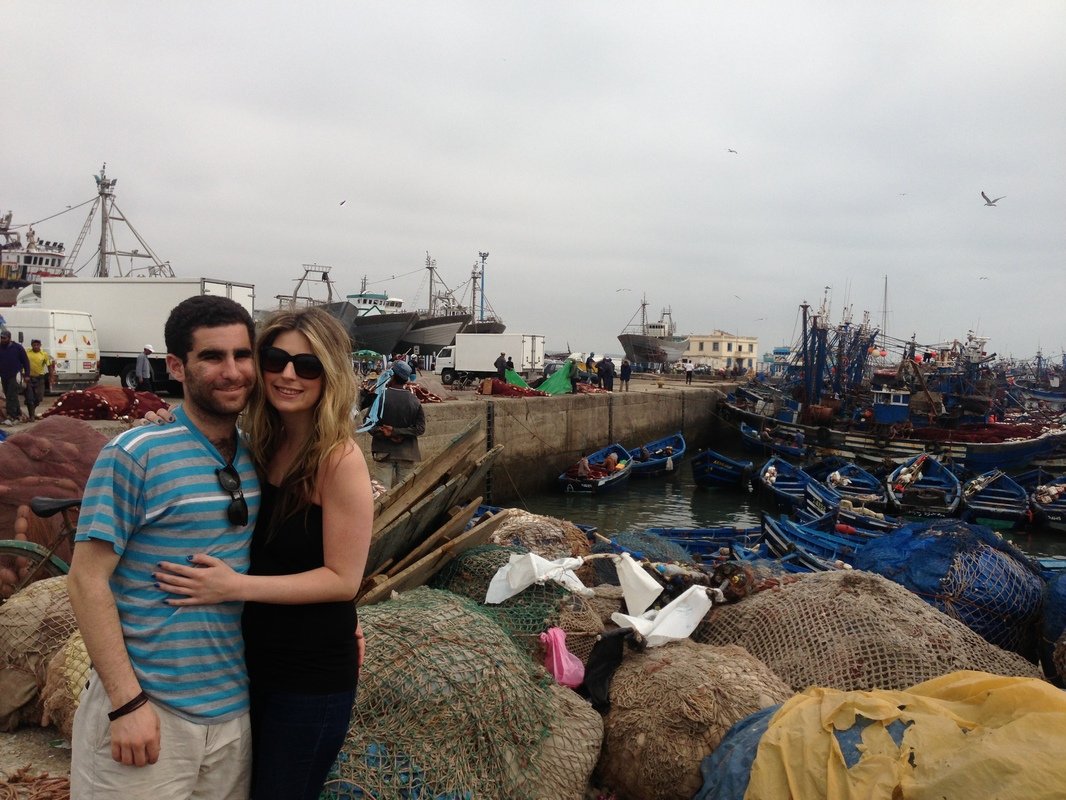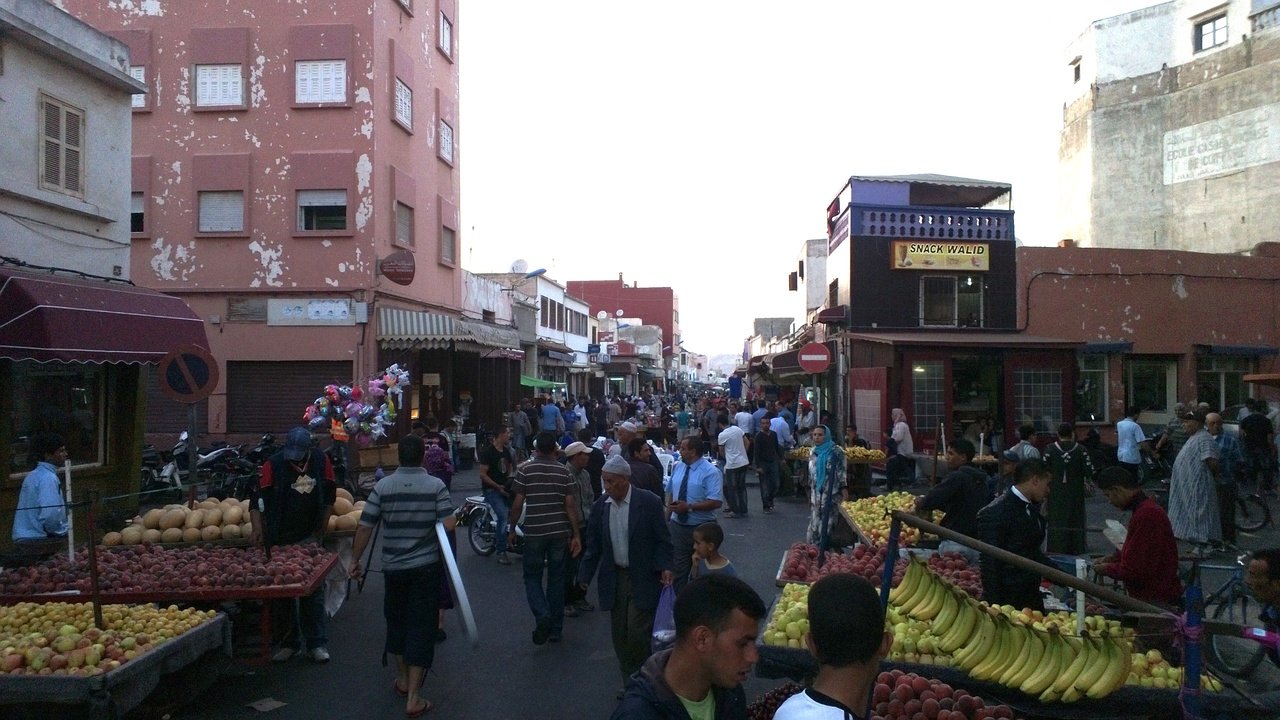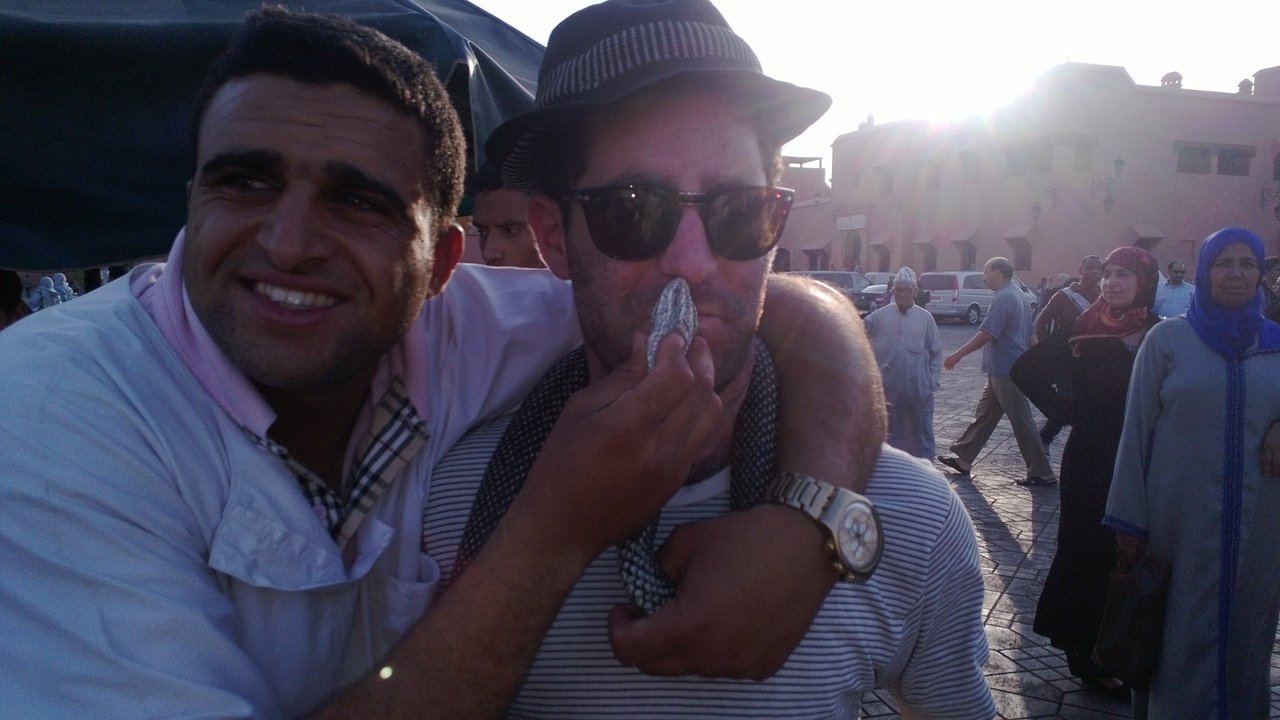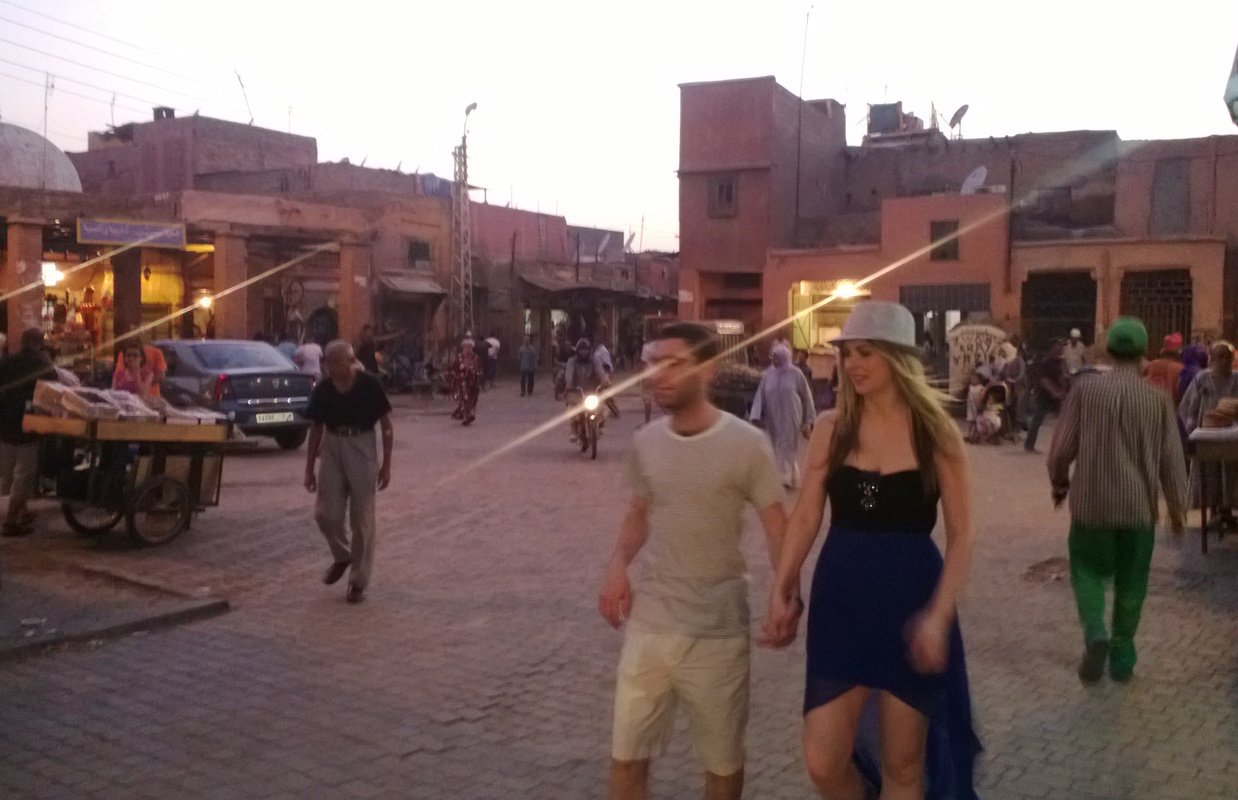
The skinny old man shuffled around the corner of the building into the open-air café. He cradled a shallow, plastic laundry tub with his two, sticklike arms. In the rear of the room, there was an electric scale on a counter, the power cord hanging limp and unplugged. He skirted the tables and plopped the basket on top.
With a practiced grip, he pulled out a panic-stricken chicken. It was scrawny, nasty, never would have made the cut at Frank Perdue. The bird’s shrill, tortured cries seared our soggy brains. We were tired, hung over, and generally beat to shit from one insane party after another in three different cities.

London. Marrakech. Essaouira.
“That’s not lunch, right?” I could hear the disgust in my girlfriend’s voice. Courtney has blonde movie-star hair, eyes you can drown in. She was wearing a straw fedora and sleeveless shirt. She screamed tourist.
I easily pass for Middle Eastern thanks to my family’s Syrian roots. Dark complexion. Hazel eyes. I’m cursed with perma-stubble no matter how often I shave.
“At least we know the chicken’s fresh.”
“We can’t eat that. We’re gonna get sick.”
“We’re already sick.”
[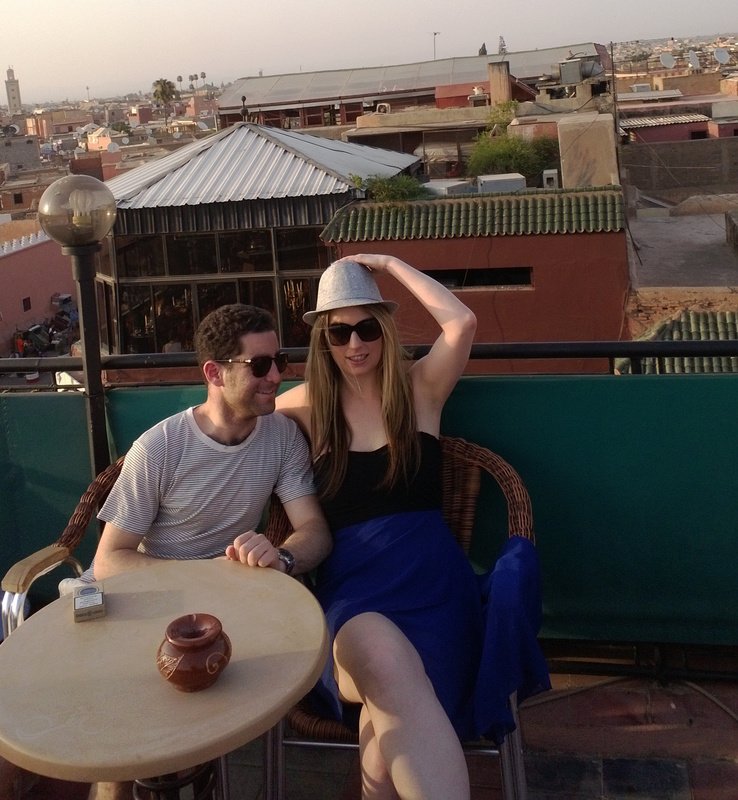
Four of us huddled around a wobbly table, just steps off the road. Me, Courtney, two of our closest friends. It was July. Despite a brisk wind whipping off the Atlantic, the air in our café was thick with a uniquely Moroccan funk of dead fish, seagull shit, body odor, car fumes and, of course, second-hand hash. Yeah, the smell was nauseating. But we were happy to kick back and take a breather after meandering for hours through the souk that morning.
The old man was small and bent, shorter than me, his nose hooked like a scythe. His skin was wrinkled and reminded me of tobacco leaves crisping under the sun. He wore a taqiyah, a short, rounded skullcap. It was gray from perspiration, blotched with cooking grease and, probably, the backsplash of chicken guts.
Our detour to Essaouira was kind of a vacation. It’s a little over two hours west of Marrakech. Two hours north of the civil war in Western Sahara.
Max Keiser, who hosts the Keiser Report on the Russian media channel RT, took us to the Groucho Club in Soho. That’s where you go to spot the glitterati. Keira Knightley, Kristen Stewart, pick a star. Over drinks, Max told us that the goats climb trees in Morocco. I never would have believed him had we not braved the desert drive from Marrakech to the coast—armed checkpoints along the way—and seen it for ourselves. Sometimes, there were eight to a tree.
Essaouira is quaint in a crumbly, third-world way. In the evening throngs of fishermen clog the harbor with their blue skiffs and sardine trawlers. They head to sea at night and return in the morning to trade their catch. For most tourists, the walled town is the main attraction. Not for me. I went for the hippie trail, to walk in the footsteps of Jimi Hendrix and Cat Stevens.
Hallowed ground.
Al Jazeera breezed through our café and spilled into the streets, the anchors describing Egypt’s Second Revolution of the Arab Spring. I was the only one in our group who spoke Arabic. But we all understood the television footage. On July 7, 2013 there were thousands of people in Tahrir Square, maybe hundreds of thousands, all cheering the military’s ouster of President Mohammed Morsi.
The old man stopped to watch, too. He glanced over his shoulder at the back wall. Satisfied, he turned and walked our way. Chicken in one hand. A butcher knife in the other. The dirty blade was crusted with blood, about the length of his forearm.
I looked at Courtney. She was pale, arms crossed tight, eyes like plates.
The old man ducked his head and presented the bird, holding it upside down by the bare area between feathers and feet. “Dick jai'yedah?”
His words mean, “Good chicken?” Pronounced JA-YE-DAH. He was requesting permission to cook the bird for our lunch.
“Mumtaz.” Excellent. I nodded and smiled yes.
He smiled, too, relieved to be speaking Arabic. Years of poverty had taken their toll on his teeth.
Something clicked for me. I got this bright idea—partly to do right by the old man and partly to avoid the hassle of paying in dirham, the local currency.
The ATM lines in Morocco are painful. You stand forever in blistering desert heat. Then the machines run out of money. And even if you soldier through the wait and find a machine that still has money when it comes your turn, you can’t take out more than 4,000 dirham. That’s around $440.
Credit cards aren’t a reliable option, either. In Essaouira it’s hit or miss whether merchants take them because the 2.5 to 4 percent fees—paid to American Express, Visa, the usual suspects—are too expensive for small operators.
“Do you have a cell phone?”
I knew the answer. Maybe there’s a shortage of decent toilets in Morocco, but everybody has a mobile, 116 of them for every 100 people. In the United States, we have ninety-three. Way behind countries like Panama with 203, Lithuania with 167, and Iran with 130. Developing nations might be poor. But they’re connected.
With the chicken hand, the old man reached over and grabbed his knife. Triumphantly, he pulled out a cheap phone with the other hand.
“Inteth bedak Bitcoin?” I asked. Do you want Bitcoin?
He eyed me, puzzled. My friends didn’t say a word. They were stuck on the bird and butcher knife. I pulled out my state-of-the-art mobile, grateful to have it still. A pickpocket tried to snatch it a few days earlier in Jemaa el-Fnaa, the main square of Marrakech, while I was dancing Gangnam style with the snake charmers. That would have been a disaster. But I punched him in the face and grabbed it back.
With my forefinger, I navigated to an Arabic video describing Bitcoin. What it is. Where to buy it. Why Bitcoin is an electronic currency as well as a method for sending payment, one that saves time and money. The explanation played for the old man courtesy of YouTube. He listened closely, indifferent to the wriggling chicken.
When the video ended, he looked at me thoughtfully. He weighed his words for a moment, his silence making us uncomfortable. He finally said, “Ew.”
Not eww as in yuk. “Ew” is Arabic for okay. He agreed to take my Bitcoins.
It was another victory in the global monetary revolution, the old man another convert to our cause. Bitcoin is breaking down borders between countries. Putting pressure on the fees charged by middlemen. Making ordinary people question the future of banks.
I wanted to pump my fist and cheer like the people in Tahrir Square. To teleport all my Bitcoin friends to this place, this moment, this small victory for a better way of doing things. I wanted to give the old man a big hug. But that’s not exactly wise when a Moroccan cook is holding a long, scary knife.
Instead, I asked, “What’s your phone number?”
He rattled it off. I texted him Bitcoins on the spot, added a fat tip, and prayed we didn’t get food poisoning.
Ping.
The payment appeared immediately on his LCD display. No delay. No government-imposed currency controls. No middleman siphoning off a percentage of our money. Paying for a meal with Bitcoin might seem like an insignificant event. But to me, it was everything: two guys cooperating freely, peer-to-peer. A Muslim and a Jew in a Moroccan city contributing to each other’s quality of life.
Could things be that simple?
The old man was happy. Me and my friends were happy. The chicken was the only party that lost out. But it was the best rotisserie I have ever eaten.

